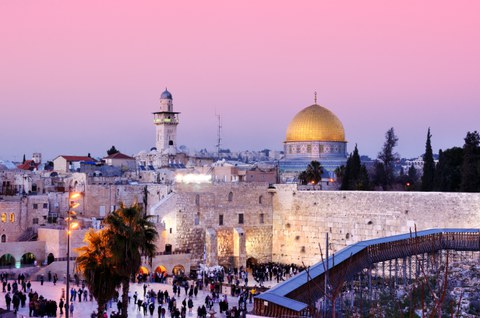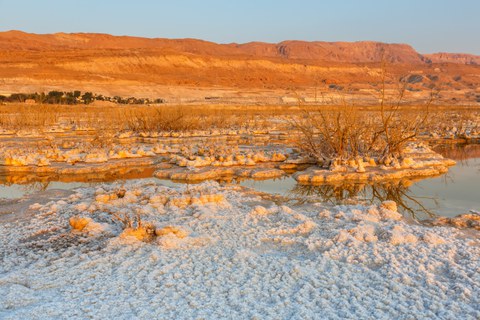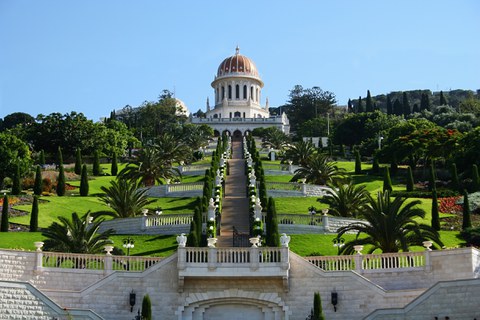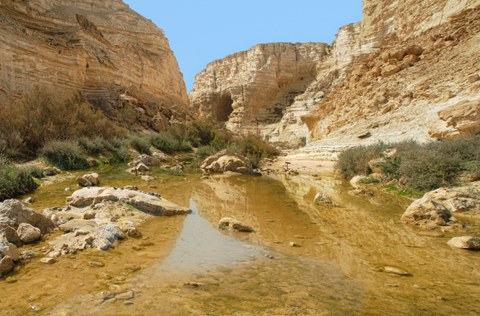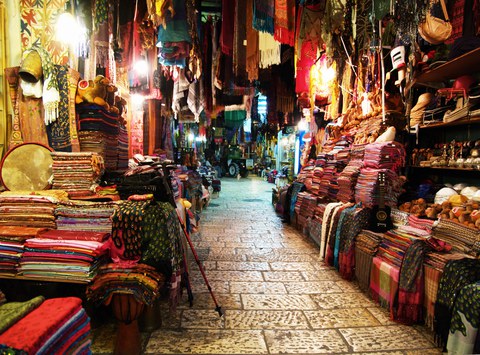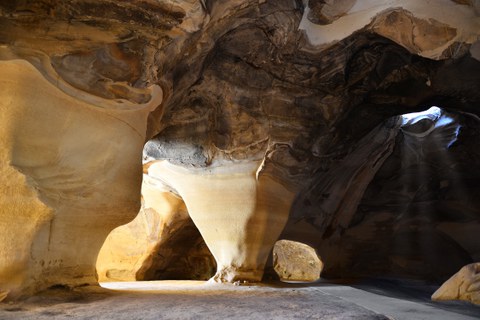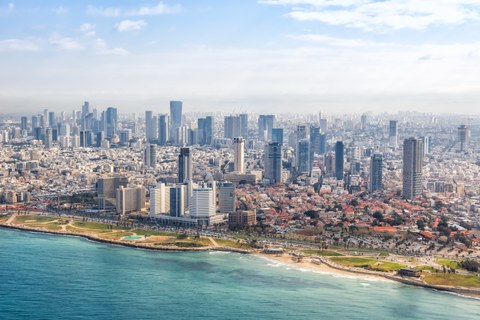Partner Country of the Month May 2023: Israel
Update: Please note that the German Federal Foreign Office has issued a travel warning and that we currently do not process student exchange applications to Israel. Israel: Travel and Safety Advisory (Partial Travel Warning for Palestinian Territory and Gaza Strip) - Federal Foreign Office (auswaertiges-amt.de) (in German)
Israel is a land of fascinating contrasts. A young state, founded less than 100 years ago, but also a country whose history dates back to the dawn of human civilisation. Littered with ancient ruins, but also a powerhouse of technological innovation. Unfortunately, the country is also the scene of the Israeli-Palestinian conflict, which probably dominates its image in many people's minds. But Israel’s beauty and diversity also deserve attention. Nature has much to offer with coasts, forests and desert landscapes. And Israeli culture combines influences brought from all corners of the world by Jewish people with local Palestinian culture. An important part of it is hospitality.
With the "Partner Country of the Month" campaign, we want to shine a spotlight on the wide diversity of countries, regions and partner universities of TU Dresden that our students can explore during a semester abroad.
Please note that both the Dome of the Rock and the market street shown in one of the images below are located in East Jerusalem, a disputed area. Israel's annexation of East Jerusalem is not recognised internationally. Germany supports a two-state solution - you can find further information at the Federal Foreign Office.
Table of contents
General facts and figures about Israel
Capital: Jerusalem (claimed both by Israel and by Palestine as the capital city)
Population: about 9 million
Official language: Hebrew. Arabic is a recognized minority language spoken by 20 % of the population.
National holiday: 5th Iyar (Day of Independence, declared on 14th May 1948)
Currency: New Israeli shekel (ILS), ₪ or NIS are used as the shekel symbol
You can find further facts, figures and information on Wikipedia, or e.g. on israel.travel. For your safety, keep travel advice in mind.
Language matters
- Hello – שלום shalom
- How are you? – מה המצב? Ma ha-matzav?
- My name is – קוראים לי… Kor’im Li …
- How much is this? - כמה זה עולה? Kama ze olé?
- Too expensive! – יקר מידי! Yakar midai!
- Okay – בסדר beseder
- Thank you – תודה todah
- See you - להתראות L'hitra'ot
Hebrew is the only lang uage in history that has been successfully revived as an everyday language. From the 2nd to the 20th century CE, it survived only as a language of liturgy and literature. Transforming a sacred language into an everyday one is of course challenging, yet modern Hebrew and the language of the Torah have more in common than modern and ancient Greek. A driving force behind the revival was Russian-Jewish linguist Eliezer Ben-Yehuda. His ideas were initially ridiculed, but eventually they succeeded. His son was the first native speaker of modern Hebrew.
The so-called square script of Hebrew is written from right to left and originally consists of consonants only. Vowel points can be added for learning purposes but are not in general use.
Another distinctive feature of Hebrew is that it reflects the directness and informality of Israeli culture. For example, the words for please and thank you definitely exist, but polite phrasing is often simply omitted in order to get to the point. So don’t be offended if Israelis do the same in English, they’re simply being efficient.
To study at one of our partner universities, English language skills suffice. Please check the language proficiency requirements before applying. You can join a course at TUDIAS to brush up your English, e.g. the preparation course for a period abroad. However, knowing some Hebrew certainly won’t hurt. VHS offers courses in Dresden (starting from German), and there are many online resources, such as teachmehebrew.com or learninghebrew.net.
Did you know that ....?
- every year, hundreds of letters to God arrive in Jerusalem? They eventually reach the Western Wall. As the remnant of the Jewish temples of antiquity and the holiest site of Judaism, the presence of God is supposed to rest upon the wall, and many visitors put notes with prayers and wishes into the cracks between its stones. The letters, as well as messages sent in alternative ways like online forms, are delivered by the rabbi of the Western Wall and his assistants.
- the largest gay pride parade in Asia takes place in the Israeli city of Tel Aviv? In 2019, more than 250,000 people attended. Israel stands out in the region for its tolerant legislation, and Tel Aviv is considered particularly LGBTQ-friendly.
- in Jerusalem, Muslims secure the fragile intra-Christian peace? Jerusalem's Church of the Holy Sepulchre, presumed site of the tomb of Jesus Christ, has been managed by six rival Christian denominations for centuries. To reduce their squabbles, Sultan Saladin tasked two Muslim families to be the keepers of the keys in the 12th century. Their descendants unlock and lock the church daily until today. With the same goal of lowering tensions, Ottoman decrees from the 18th century carefully regulate the division of the church into individual sections. Despite these measures, the Church of the Holy Sepulchre is sometimes the scene of bizarre escalations.
- Israel is the world champion of water recycling? A full 90% of wastewater gets recycled here. Most of it ends up being used in agriculture. By comparison, Spain is in second place with only about 25% of wastewater being recycled.
-
many inventions originated in Israel, including anti-virus software and firewalls, cherry tomatoes, voice over IP, and the first instant messaging service ICQ? Also of Israeli origin is Krav Maga, a martial art that is especially effective for self-defence. It was developed by Imi Sde-Or, who in 1930s Europe used his martial arts skills to defend Jewish neighbourhoods against fascist riots. These experiences with street fighting later shaped Krav Maga.
-
Israel was the first country in the world to ban underweight models in order to prevent eating disorders? Since 2012, every model must at least reach the lower limit of normal weight. The law also states that image manipulation used to make models appear thinner must be clearly labelled.
- Israel is the perfect country for archaeology enthusiasts? With tens of thousands of years of settlement history, it's no wonder that archaeological sites can be found everywhere. About 37,000 are said to be registered throughout the country, offering many opportunities to volunteer for a dig. But even when simply going hiking (an Israeli national pastime, by the way), it happens time and again that people just stumble across significant finds by chance.
- restaurants and cafés in Israel have the legal obligation to provide tap water free of charge? Violation of this obligation is punishable by hefty fines.
Cooperation with TU Dresden
You can find all cooperations of TU Dresden in our database. Have a look at the experiences of our previous exchange students at Questionnaires. Professors at your faculty may have direct contacts to your partner university of choice and can advise you.
Our Israeli partner universities via TUDworldwide
- Technion - Israel Institute of Technology in Haifa
- Interdisciplinary cooperation with a focus on engineering and engineering trades
- The Technion is considered to be Israel's MIT - the top university for scientific and technical courses. In addition to the classic natural sciences and engineering courses, the course spectrum also includes, for example, Education in Technology and Science, Architecture and Medicine.
- On the slopes of Mount Carmel and right next to the Mediterranean coast lies Israel's third largest city, Haifa. In this perfect location, you can always quickly reach the beach or go hiking in the nearby Mount Carmel National Park. Haifa's landmark is the Shrine of the Báb with its elaborately terraced Hanging Gardens.
- Hebrew University of Jerusalem
- Interdisciplinary cooperation
- Jerusalem's Hebrew University is considered the most noteworthy university in Israel. It offers the entire spectrum of courses in natural sciences, humanities and social sciences. The faculties are housed in various campuses that are spread out across the city of Jerusalem.
- Albert Einstein was one of the founders and supporters of Hebrew University, along with other well-known figures such as Sigmund Freud. Einstein gave the first scientific lecture, was active in the administration and bequeathed his academic and personal archives to the university.
- Jerusalem is a fascinating city full of historical sites from five millennia. In the Middle Ages, it was said to be the centre of the world. Today, it is still of great importance to Judaism, Islam and Christianity. Jerusalem's labyrinthine Old City is divided into four quarters, each with its own unique ambience.
Don't miss...
Ein Avdat National Park, located in the Negev Desert of southern Israel, is wonderful for hiking. Between the high, dry walls of a canyon, a small stream leads to its source in the rock, forming waterfalls and ponds. On a circular hiking trail, you can also explore the desert landscape nearby, visit the caves of hermit monks from Byzantine times and, with a bit of luck, observe Nubian ibexes. By Israeli standards, the Negev is far away from our partner cities - that is, the Negev’s capital Be'er Sheva can be reached in about 2-3 hours by public transport.
Markets are a very different experience in Israel than over here. In a lively and open atmosphere, people haggle to their heart's content and at the food stalls it’s okay to try a little something. Whether it’s fresh fruit and vegetables, handicrafts, street food, baked goods, clothing, spices, jewellery or antiques - there is so much to discover that you should probably start your exchange with plenty of room left in your suitcase.
Beit Guvrin-Maresha National Park lies in a landscape of gentle hills and is full of accessible caves that count as a UNESCO World Heritage Site. Among others, there are Sidonian burial caves with magnificent murals, caves with bath tubs or pigeon breeding niches dug into the walls, and so-called bell caves that served as quarries and are lit by daylight through openings in the ceiling. The fascinating cave systems are part of the ruins of ancient cities.
As Israel’s second largest city and a modern metropolis, Tel Aviv stands in contrast to Jerusalem, steeped in history. The city that never sleeps has a vibrant nightlife, skyscrapers, and countless events. Not to mention culinary experiences such as legendary smoothies, fruit from the Tel Aviv Port Market, or tasty falafel with hummus. The Tel Aviv coastline consists of kilometres on end of sandy beaches. In the evening, you can walk along the beach promenade to the medieval harbour district of Jaffa (because in Israel, you're never really safe from history).
HaMitfletzet. Jerusalem has many sides: Holy city of three world religions, bone of contention in the Israeli-Palestinian conflict, and home to a curious monster. In Rabinovitz Park, its three tongues serve as slides. When artist Niki de Saint Phalle first presented her design, it was roundly rejected – too scary for children. She successfully argued that children benefit from mastering their fears in a safe space through play. In fact, HaMifletzet (the monster) was wholeheartedly accepted by Jerusalem's children and has become a landmark of the city.
Let's get cooking...
The cuisine of Israel combines influences from all over the world with traditional Middle Eastern food. Hummus and falafel are particularly popular and ubiquitous dishes – a fact that is not always appreciated by the neighbouring countries, as the Hummus Wars show.
Eating a vegan or vegetarian diet is popular in Israel and it’s not hard to find the right dishes. Most restaurants have plenty of options. With typical ingredients like chickpeas, olives and fresh fruit and vegetables, many Israeli dishes are plant-based anyway. What’s hard to find, on the other hand, is pork, as it’s unsuitable for both Jews and Muslims.
As far as snacks are concerned, the top seller in Israel is Bamba. These peanut snacks are bought regularly by about 90% of Israeli households. The saying goes that infants are weaned from their mother's milk directly onto Bamba. Interestingly, this has been linked to the particularly low prevalence of peanut allergies in Israel.
Shakshuka
Shakshuka originates from North Africa and is the main competition for hummus and falafel when it comes to the question of Israel’s most popular dish. Not only is it delicious, but also practical: The ingredients are cheap, preparation needs little time and you only use one pan. Shakshuka is a typical breakfast dish but actually fits for all other times of the day, too. While for traditional shakshuka eggs are poached in a spicy tomato sauce, there are no limits to creativity.
Ingredients:
- 2 tablespoons olive oil
- 1 onion
- 1 red bell pepper
- 4 garlic cloves
- 2 teaspoon paprika
- 1 teaspoon cumin
- ¼ teaspoon chili powder
- 2 cans (800 g) chopped tomatoes
- 6 eggs
- salt and pepper, to taste
- 1 small bunch fresh cilantro
- 1 small bunch fresh parsley
- Pita bread
Preparation:
1. Chop the onion, the bell pepper and the greens. Finely chop or press the garlic cloves.
2. Heat the olive oil in a large pan on medium heat. Add the onion and bell pepper and cook for 5 minutes or until the onion becomes translucent.
3. Add garlic, paprika, cumin and chili powder and cook an additional minute
4. Pour the cans of tomatoes into the pan. Season with salt and pepper and bring the sauce to a simmer. Cook until the sauce is thick enough that when scraping it away from the bottom of the pan, it takes a moment to flow back.
5. Make small wells in the sauce and crack an egg into each well. Cover the pan and cook for 5-8 minutes, or until the eggs are done to your liking.
6. Garnish with cilantro and parsley and serve with pita bread.
(Many thanks to downshiftology.com!)
Contact
Have you had a great time in Israel? Do you have tips for places and experiences that are not to be missed? We would be happy to share your experiences here, on social media or, if you want, in information events for other TUD students. Get in touch with us:
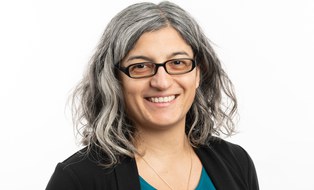 © Sven Ellger/TUD
© Sven Ellger/TUD
Advice on studying abroad
NameMs Federica Serra
Infocenter/ Study abroad; TUDworldwide: America
Send encrypted email via the SecureMail portal (for TUD external users only).
Visiting address:
Fritz Foerster Bau, Office 161 Mommsenstraße 6
01069 Dresden
Postal address:
TUD Dresden University of Technology International Office
01062 Dresden
Office hours:
- Tuesday:
- 09:30 - 11:30
- 12:30 - 14:30
- Thursday:
- 09:30 - 11:30
Please register at the SCS (FOE, floor 0).
Partner Countries Archive
Have you missed a partner country? No worries! Here you can read up on all articles.
|
Europe (Erasmus+) |
|
|
Africa |
|
|
America |
|
|
Asia |
|
|
Australia and Oceania |
|

